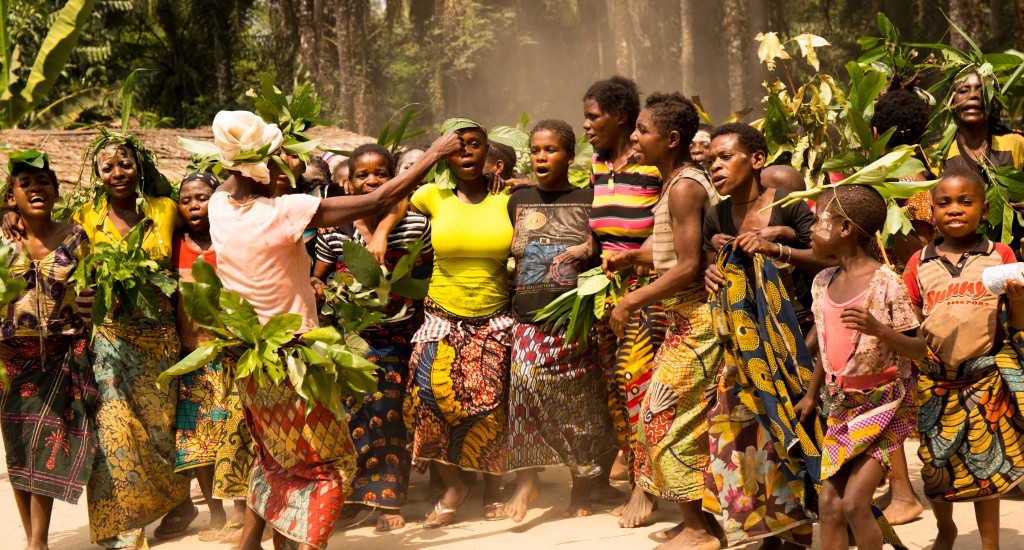P E A C E F U L A N D E G A L I T A R I A N
R A I N F O R E S T L I V I N G H U N T E R A N D G A T H E R E R S
New research by the anthropologist Jerome Lewis
J E R O M E L E W I S E X C E L L E N T L E C T U R E
A B O U T E G A L I T A R I A N H U N T E R & G A T H E R E R S
I N T H E R A I N F O R E S T.
The lecture I initially have linked to above, Gender Egalitarian Relationships Among Hunter And Gatherers and quoted on this page is now removed from the list of lectures on RAGs homepage. But instead Jerome Lewis has delivered this text free for everybody to read on internet, and which I suppose is of a better more stringent quality than his talk from the lecture, which I have written down on this page as I found it so extremely interesting:
FOREST HUNTER-GATHERERS AND THEIR WORLD: A Study of the Mbendjele Yaka Pygmies of Congo-Brazzaville and Their Secular and Religious Activities and Representations
And instead of the initial lecture I have linked to his brilliant TED-talk above:
EXTREME CITIZEN SCIENCW IN THE CONGO BASIN by JEROME LEWIS »
______________________________________________________________________________________________________________
GENDER EGALITARIAN RELATIONSHIPS AMONG HUNTER AND GATHERERS
a lecture by the anthropologist Jerome Lewis
Jerome Lewis presents ideas about a range of different egalitarian gender relations - which is surprisingly neglected in the anthropological literature, and that´s why he wants us to she light on some of these questions tonight.
There are certain basic ideological, political and economical determinants to the relationships between men and women in society. And HL hopes that his review of some of these, would be helpful in thinking about what we are doing about gender relationships in our own societies, and how we might think about improving the degree of equality that we already have achieved.
He hopes that while he is talking about people who live very far from here, that some of what he says might have some relevance for broader thinking about what we are doing right now in our own societies.
He announces that he is going to talk about the degree of equality, so in order to set the context from the standing of gender relations, his first example is going to be a profound inegalitarian gender relationsship. And te reason to that, is that some of the structural means by which men have succeeded in controlling the bodies of women become a paramount.
AT FIRST A CONTRASTING POLAR OPPOSITE: PATRIARCHY
The Hamar people i Eastafrica - an example of inegalitarian gender relationships
The Hamar is a group of people living in southeast Ethiopia.
They are saying that they are there most beautiful people on the earth. And JL says he thinks they are probably right, as he to thinks they are extraordinarly beautiful people, both men and women. They are proud of their physical beauty, so many of them refuse to wear clothes. They think that´s a sign of shame and so JL had some very interesting interviews with some elderly men sitting there very proudly naked discussing their culture… a very interesting group of people.
Among the Hamar the women are owned by men. And understanding something of how you can come to a situation where women are being owned by men its interesting to illuminate some of these key features about gender realations more broadly.
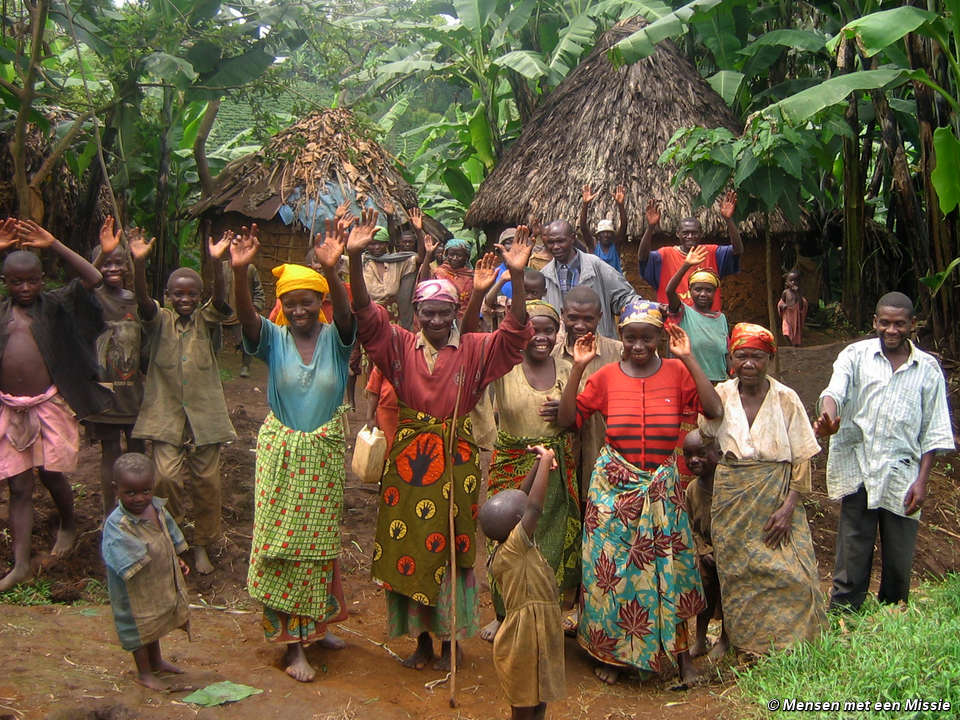
JL is just going to focus three or four main examples with the Hamars as a start. And then he is going to take us on a little journey to hunter and gatherers (HG) focusing at the contrast in particular between gender relations in southeast Asia and gender relations in Africa among these egalitarian HG.
JL will discuss a broad range of approaches of thinking about the nature of relations between men and women and will start with a pastoralist group. Animal domestication ocurred quite a while before plant domestication and its interesting to understand some of the dynamics that the pastoral economy demands in order to perpetuate itself successfully over times. Some of these demands create opportunities for old men to control young men´s access to women and this is intricately built into the system of pastorals nomadism, which groups like the Hamars practice. To illustrate that he tells the Duka Story.
(Despite these alleged demands there are several pastoral nomadists in the world who are matriarchal as for example the Tuaregs in Mali and several other peoples in the Sibirian et al.)
Duka´s story
Duka is a Hamar woman that JL met about eight years ago, when he was doing some researh in southeast Ethiopia, in order to find out what had happened to the former hunter and gatherer of the region. Duka is a very beautiful and strong woman, JL says, and also a very determined woman. On the photo he shows she is sitting beside her former sweetheart who belongs to a hunter and gatherer-people in the neighborhood, a very strong and nice man himself. And they were childhood sweethearts for many years and eventually Duka became pregnant with him. But the child was killed at birth. And this event announced to the community that she was ready for marriage.
And something that has happened to her in her youth, then came into play, which determind her future. Because she was so beautiful as a young woman, so many men were after her, seeking to court her and become her partner. But there was an old man called Mieli who was particularily keen on having her as a wife. And following Hamar tradition he payed a group of young men to catch her on her way back from fetching water and smear cow dung on her palms and hands in his name.
This effectively bestowed her to Mieli when she would become of age.
So noone, apart from him, was allowed to marry her, because he had smeared the cow dung on her palms.
So when it appeared that she was fertile, this was the monent Milei took to claim his right to marry her, telling her that she has to come to his homestead. But she resisted this; she didn´t want this to happen, she had really no desire whatsoever to marry him.
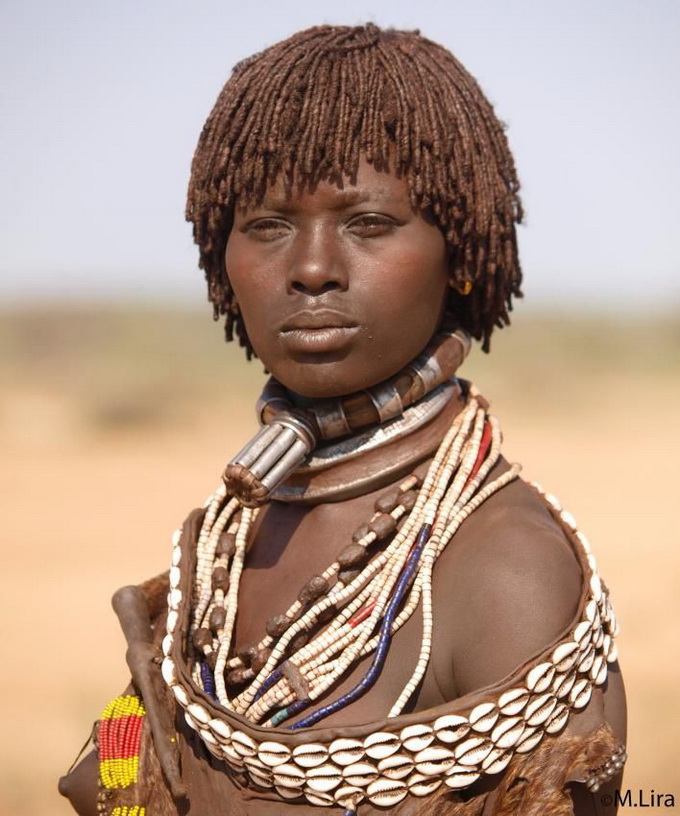
But Mieli had payed 38 cows to her father, a whole bunch of goats and a lot of coffe and honey and this effectively gave him right to own her body. Many guests were invited, they were wined and dined for ten days and Mieli made sure that everyone was very satisfied with the event. She continued to hate him, but she was forced to stay with him, her father throw her out.
So because she didn´t want to have anything to do with him, her inlaws put her in this platform in the middle of a hut, and that was where she had to stay. She wasn´t allowed to move from there for two months, except to go for a pee.
Every night Mieli would come in and try to force her to have sex with him and every night she refused. She was beaten, she was ripped and all the other women in the camp would come and tell her she had to sleep with him. Even her own parents were asked to come and were trying to coerce her, but she persisted, she was very determined despite all this bad treatment and coercing and continued to refuse. So eventually after two months of persistently refusing him, he became humiliated and he rejected her and so she became an outcast, with nowhere to live. And in southeast Ethiopia this can be a problem if you are a single woman. So she moved around looking for somewhere to stay and arrived at the banks of the river Omo, which by then were occupied by a group of people called Gomba, which is in decline. Essentially there are so few of them that they will no longer exist. ( LJ:s task was by then about to understand why and how groups disappear, wich is very interesting, but a different subject). And there Duka met Sepo and Sepo fell in love with Duka. And he said; - Look, don´t worry Luka; you are most welcome to stay with me, on my farm. He had a little farm down by the river where he grew corn, so he invited her to remain there with him.
And the problem for Sepo and the Gomba people is that people in groups who have lots of cows keep buying there women out so that they no longer have any women to marry. And this is actually the most common way these groups disappear. Its not through war or epidemics or other things, but through more powerful groups marrying out their women, so that eventually men like Sepo don´t have anyone to marry.
Since living with Sepo, Duka has had at least two children. She was pregnant when I was there and was just about to give birth to her third, but each time she gave birth, Mieli would send people to came and snatch the baby from her. Because, as far as he was concerned, he still owned her reproductive rights. That´s what he has payed her father for, so she has no right to keep those children for herself. And so she was deeply hurt by this and very upset. But she couldn´t do anything about it.(12:38)
So at the root of Dukas problem is the bride wealth system, that is a feature of pastoralist culture across Africa.
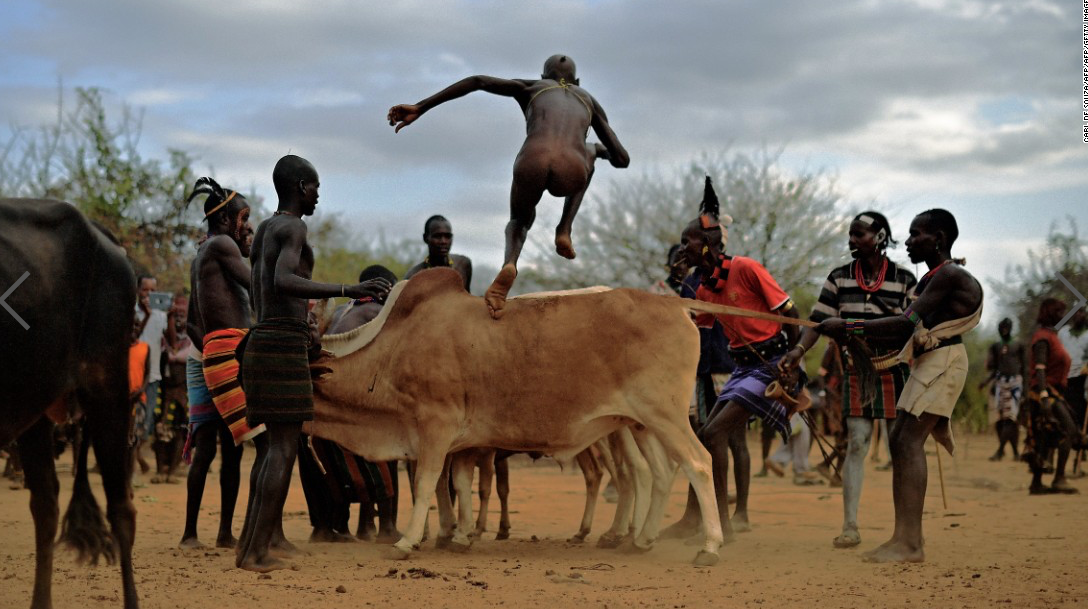
How do the pastoralists ensure the labour that you require to bring these herds of cows from where they are pastering, down to the water? The man who make this work, start in the crack of dawn or even before the sun has risen. They start walking and eventually they have to share slots of the river so that the cows don´t get mixed up and so on.
So they come down to the river and then they have to take all the cows back to the camp again and it basically takes the whole day, so there is no time for anything else you can do. And so because of the bridewealth system and the ecological fragility of this region you can get drouts or epidemics that wipe out whole herds. And young men, if they want to get married depend on the sufficiant amounts of cows to pay the bridewirth. So if you need 40 cows to get married then the herd must be at least 40 cows. So the business of moving these cows and caring for them is something that these young men do. And the way they are motivated to do that by the elder men, is by the promise of their bridewealth to be payed when they eventually get marrired. And because of these problems with drouts and epidemics and so forth, its often the only way to get married to go raiding and to steel someone else´s cows and then present them to the future father in law. So this is indeed what happens quite regularly in this area and results in chronic conflicts and is a reason why every young man is armed and from a very young age. JL says he has seen far too many guns in this area and that it frequently happens that young men when they get angry and argue shoot each other.
So this; By controlling young men´s access to women, elder men make sure that the young men take care for the herds for many years. And so you have a situation where old men marry young women, and old men can marry several young women, so there is always a dearth of young women for young men. And of course the seniority of men will also contribute to dominate there women, as ages is seen as a sign of superiority in these systems. And because of the polygamy the young men are really very dependant one old men during the time they can get married.
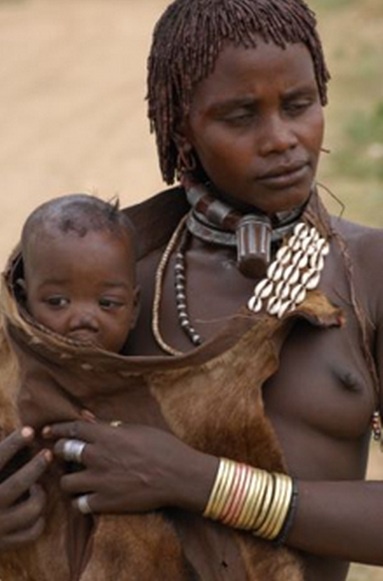
Among cowherders young med would marry around the age of late thirties to early fourties, whereas if you are camel herders you will get married around the age of 45 plus to 50. And the reason is that the gestation period among camels is longer than the gestation period of cows. It takes longer for the latter to generate enough camels to pay for the bride. So the economic system and the requierments of it, provide opportunities for men, and particularily senior elder men to manipulate and control other people.
JL says that he had a very interesting conversation with one of these senior elder men and. He says he has never been to another part in the world where young men obey the elders the way that these young men do. It really is remarkable. An elder man says something and the young men who are strong and easily could overcome this man, just attend to the every word and do it without any protest whatsoever. It really is astonishing how powerful this hold is. Jl says he was talking with one of these elderly naked men about bride wealth and the issues around bridewealth payment and he just said:
- Hah! We are not like you Europeans, yo marry like wild animals. We marry properly we are people. You go to bars and pubs (although he didn´t use that word!) and think that when you get drunk at night you will meet your partner for life and hook up and be a happy marriage. You are crazy, just like wild animals! We do it properly, we discuss with the parents, we look at the girl, is she good, how does she work, is she going to be a good contribution to the household, before we promise that she should marry our young man. Thats how we marry properly, we pay bridewalth aso.
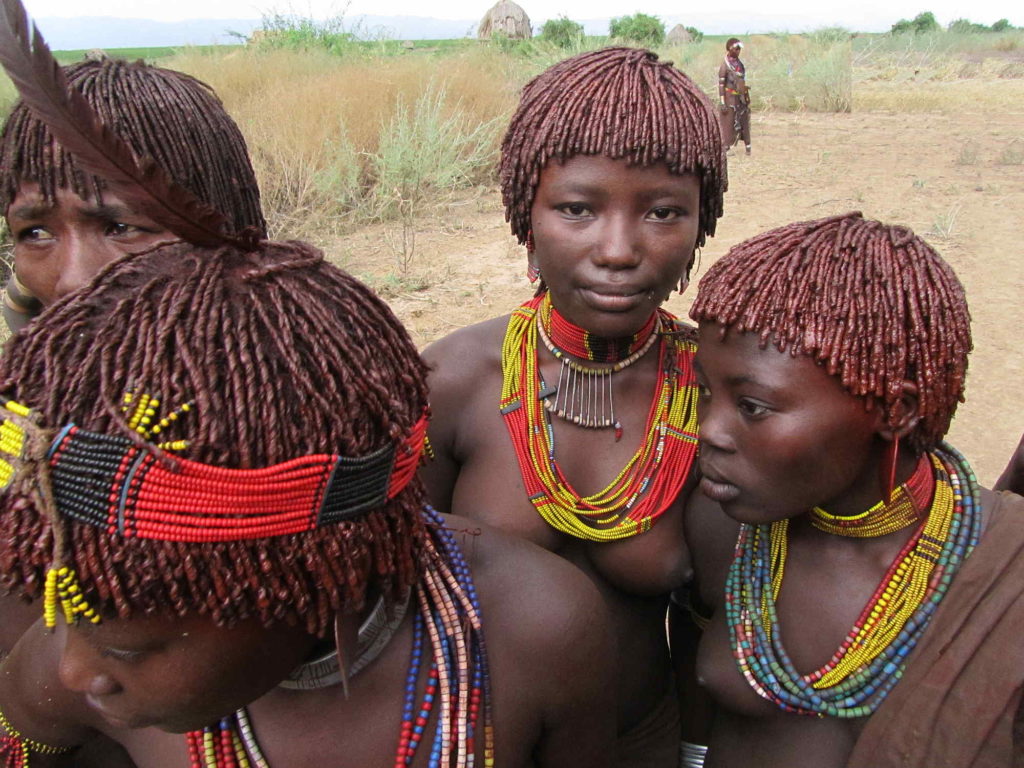
So there is a very clear sense among these people that this is how they distinguish themselves as human beings in opposition to the way animals come together and copulate and make their offspring. But that kind of ideology justifies these vey powerful relations between gender and between groups. And why these elder have this extraordinary power to control and manage peoples relationships.
And if these young men ennoy these elders they cannot get married except for in the way Gomba has its way. A lovely marriage; Duka and Sepo are very happy together. But he can´t keep hold of his own children, which really is a tragedy. This control over women´s sexuality and over their bodies and their reproductive potential - here JL suddenly corrects himself: Not over their sexuality because women actually do have a lot of affairs, so its only their reproduction that´s controlled. Whatever happens in terms of getting pregnant always comes back to the old men as labour for the future.
By delaying marriage like this, the older men ensure that they have a workforce to look after their herds, so that they themselves can sit and drink coffee while their herds grow and get big. So these societies are what we would call classic "delayed return societies". They are societies in which you invest labour into something in order for that labour to give you a return at a later date.
JL claims that most societies at least temporarily exist on these conditions.
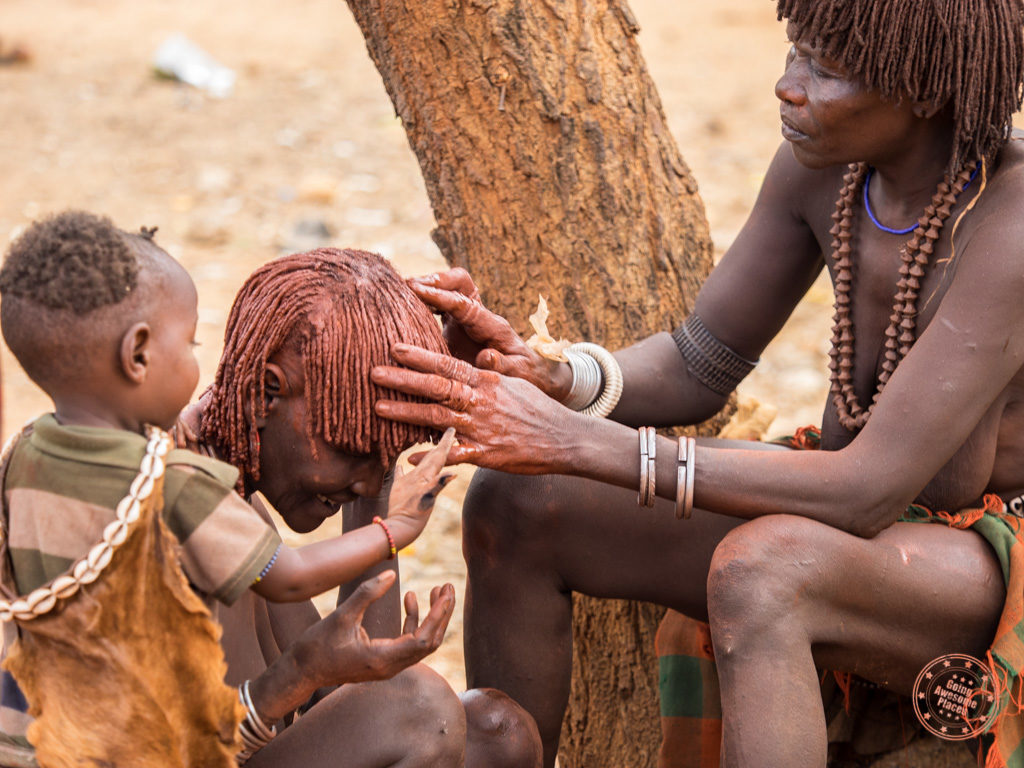
DELAYED RETURN SYSTEMS:
Long term investments need to be protected and managed to assure their yield.
This lead to the elaboration of hierarchies of responsibility and authority and notions of exclusive property.
The eventual yield is distributed to those whose labour went into producing it. This distribution produces hierarchy and authority.
Of course this "delayed return system" does not apply only for cows and camels, but the same could be said about farming or factory or whatever it might be. You invest something and you have to protect that over a period of time, before you can get your yield. Its because of that delay, that power and authority can start to emerge to the manipulation of people´s access to products at the end. So delayed return systems naturally lead to the hierarchy of responsibility and authority and notions of exclusive property. What happens is that the old men can control the young men´s access to women so that the young men do everything to the word and to the letter, that the old man say.
In a farming community for example, if I have asked for a whole group to come and help me on my farm, I better make sure that by the time the harvest come, the people that has helped you will receive something back, in order to enjoy your labour the following year again. And through that process I can get that labour again, but I can also manipulate that distribution in ways that favour certain people above others. If you displease me by doing something I don´t accept, I can withhold your part and cause you substantial problems to survive. So as soon as you have this delay in your application of your effort and the enjoyment of the yield, there are all sorts of opportunities opened up for individuals to manipulate the distribution of that yield and to exert power, influence and authority over you.
(Despite this, there still exist agricultural as well as pastoralist economies being egalitarian and matriarchal, as is shown by contemporary research by Abendroth, Peggy Reeves Sanday et al , and it would be interesting to have a discussion about the reason to that, my comment)
And the distribution produces that hierarchy and it gives teeth to authority by deciding to whom I will give or not, I am able to put pressure on people.
I just wanted to get that sort of basic ground clear, before we start talking about almost the polar opposite, which is what happens in certain hunter and gatherers where you really do have gender egalitarian relations.
EGALITARIAN SYSTEMS AMONG HUNTER AND GATHERER IN AFRICA AND ASIA
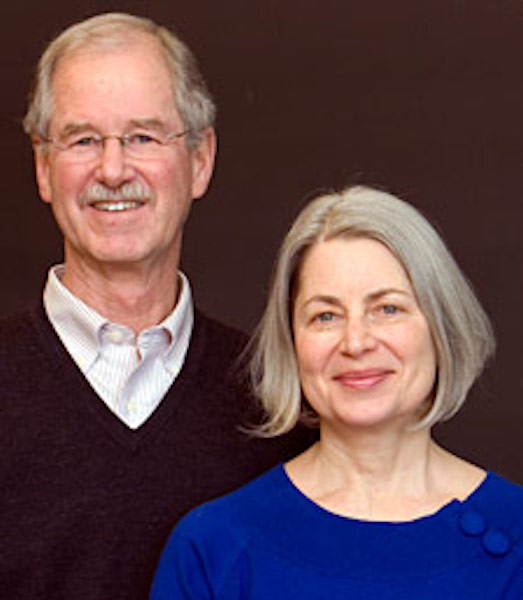
THE ANTHROPOLOGISTS KIRK AND KAREN ENDICOTT / BATEK IN MALAYSIA
Karen Endicott is the wife of the famous anthropologist Kirk Endicott and they both studied the group of Batek in Malaysia together in the 1970th. This was just at the time as the feminist anthropology was growing strong, but very much taking the view that everywhere in the world, women were oppressed by and subordinate to men and this was almost a dogma. Sherry Ortner et al, proposed this as a human universal.
But Karen Endicott living with the Batek in Malaysia discovered that among them there was not this universal, as the Batek women had at least the same amount of power as men, and there is no way of really determining any inequality between the gender groups.
When she came back after having finished her field work and started to give talks to anthropologist groups in Australia where she was writing her PhD, women and other anthropologists didn´t believe her, and was telling her that she was lying or romanticising.
Karen as a result of all this doubt and because of having been called a romantic or lier, wich is very insulting after many many years of hard work, left anthropology, got fed up with it, and left her career, which is outrageous - a real tragedy. She could have transformed anthropology had she persisted.
And here JL gives a report of his own upset reaction to the similar treatment of not being believed when communicating his findings in his research, just trying ones best to represent these groups as clearly and articulate as possible, and communicating something one has experienced and lived with for long periods in these places in the world, knowing for sure that one isn´t romanticising anything at all, but just telling the truth about how it really is.
But it does exist so we need to talk about it, and explain it in order to understand it!
Anyway Karen got fed up with it and gave up. Her first paper explained this 1979 and she didn´t publish a book about it, until 2007 almost although three decades after her first paper was written 1978-9. Can you imagine - the trauma is deep and if you talk to her, you can see how upset she was by all that, all her peers just dismissing her powerful ethnography. Anyway, in this 1979 paper she writes:
“When a society has authority positions to be filled, male dominance seems to be the usual, if not the universal consequence, if of no other reason than that men would preclude female opposition by sheer rude force”
And that´s a very profound insight which people don´t really engage with. And perhaps delayed return economies delayed return systems dominate the societies of today, its all too easy to presume that everywhere must be like that, which actually is not the case.
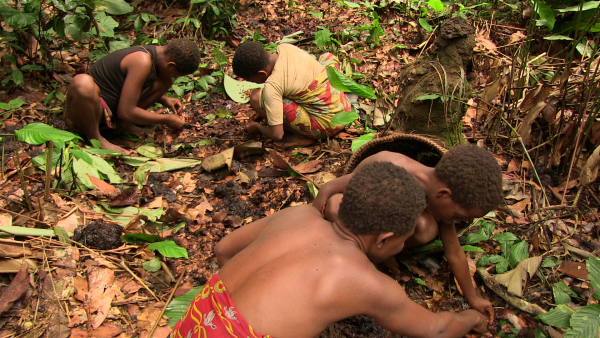
The way people talk about egalitarianism is also very confused, and you know we are all familiar with the sort of cold war scenario with these capitalist societies who were encouraging the enequality between people based on their achievements and the communist societies who were supposed to level that out and somehow redistribute things. But of course in both cases they both cultivated hierarchies, so in the communist countries partymembers got access to privilegies in housing in education and in material things as cars and clothes aso.
And in capitalist systems they promoted an ideology of egalitarianism but in this case it was an ideology of opportunity. Everyone is born equal in dignity and rights, thats number one on the universal declarations of human rights, which is a wonderful ideal. But in reality is not true. Take this country for instance; if you are not white, brown or various combinations, and if you are female, if you´re not born in the south of the country you have a very different set of oppurtunities, in comparison with someone who is born in the north of the country, who is black, who is a woman - you know there are all sorts of studies of these things and glass ceilings and all. so the ideology of this kind of egalitarianism society, is of course just an ideology and not a reflection of the truth, and the practice and the outcomes. So we talk of us being a meritocracy; We all start equal but somewhere on the way some of you will become very famous or rich or whatever, and others will not. And again you have an ideology here which justifies and legitimates an inequality of outcomes, and that is a profound inegalitarian system, of course.
So now we will talk about egalitarian societies which don't only nurture egalitarianism as an ideology but beyond this also is a practice and an achievement of an equality of outcomes and thats quite different to what happens in all these other societies.
There are some requisites to how this happen according to the work of James Woodburn who has done a structural analysis of HG societies to show what are the core features that they share.
EQUALITY IS ACHIEVED:
1) through direct individual access to food, water and raw materials needed for tools
2) by mobility
3) by procedures that impose sharing and prevent accumulation
4) by `leveling mechanisms´such as mockery or avoidance that assert egalitarian values and reject authority.
And what´s remarkable is that these core features not only appear in Africa, but they are distributed around the world. And that distribution around the globe suggest very strongly that these are features of human sociality that predate our dispersal from Africa, and therefore hold a very important significance for the understanding why we are the way we are.
EQUALITY IS ACHIEVED:
1) through direct individual access to food, water and raw materials needed for tools
If you think about the core political rangling of humanity; it is based on the opposition of some people who seem to legitimate inequality and other people who instinctively resist and dislike and fight against the claims that tries to justify inequality. And its true in religion as well, so religion and politics are supposed to be very close, eternally around the world concerned about justifying inequality or trying to promote inequality and thats the basic game of politics in human societies.
In these places where an equality of outcome is achieved, you have direct access to food (and I will give you examples of how that come into practice later) and water and the raw materials needed for tools. So people have direct unimpeded access to the basics they need for their survival. The idea of private property in these societies is really not approved of(31: 57) and they get really annoyed with any one claiming private properties - even gorillas and will swear and insult any gorillas that will make noice signallig: get away get away this is my forest, JL:s friends will start insulting them, that´s not acceptable; You piss off, aso. They will use the worst words that they know.
In these societies its considered to be a birthright to have a direct access to the things you need.
EQUALITY IS ACHIEVED
2) by MOBILITY:
No-one can stop you from moving away.
Should you desire to leave the group, no-one can stop you. And therefore its quite common in these societies to have no word for goodbye. You just go and there is no-one who has the right to demand an explanation and they don´t indulge in that sort of sentimentality that we are indulging in in our society, the kiss the hug aso. People just go and its their right to go and you must not impede that freedom of movement. If someone is starting hassling you, you just get up and go and you don´t have to tell its because you hassle me; you just go. Its called the strategy of avoidance.
AVOIDANCE STRATEGY is a key strategy in this societies, enabling people to remove themselves from situations that make them depressed or someone who tries to suppress or manipulate them. Or if you have had an argument, you don´t need to sort it out, you can have your argument and then you just leave and go, move elsewhere and then time will probably resolve the problems. So this is a very common way of solving conflicts. When you don´t have a field or a farm or a house to defend, then you have the possibility to move away without sacrificing any of your vital resources.
EQUALITY IS ACHIEVED
3) by procedures that impose sharing and prevent accumulation
Accumulation is of course potentially one way of asserting or influencing other people. If I have got lots of something that somebody else needs, then I can make demands of them, in order for them to get access to the things that I have. So accumulation is seen as a bad thing as immoral, as wickedness and what people should do in these societies is to provide what they have got from the environment to other people on demand.
When you share people in these societies it takes quite another dynamic, than int the societies in which you can make use of the system of delayed return to make demands on people. In these societies you can´t refuse anyone what he or she demands from you and very quickly that is dissipating in the group, that you delivers to it, without you having any control over it, so there is no possibility to use it in order to get any authority power over that flow whatsoever. This is what we call demand sharing in the HG literature.
In DEMAND SHARING IN HG SOCIETIES its crucial to understand that this quite a different economic process from what we are familiar with as “sharing”. One man hunted to much and instead of being celebrated and achieve lots of statues and girls - he was thrown out he was chased away by the women, who said we are not cooking your meat any more. You hunt too much! So the man had to leave Mbedjele and had to go and find a wife among Baduma. And some ten years later I just bumped into him by chance and then he had had to move from the Baluma to the Mikaya, other groups of pygmies, and it was his boasting; he couldn´t control himself he loved hunting, and for some reason he couldn´t figure out that this was causing him so much trouble and he just kept on being kicked out from one community after the other, and its deeply painful to him, because he is really a tragic human being as a result of this.
In these societies each individual is potentially atonomous and can fulfil their basic needs without being dependant on any other individual. Whether you are old and sick you will always obtain your share.
People who do go over the top, get levelled off.
EQUALITY IS ACHIEVED
4) by `leveling mechanisms´such as mockery or avoidance that assert egalitarian values and reject authority.
So the hunter BenaSongo before he was exiled was teased, was insulted, he was made a mockery about by all the people in the camp at various points, and people would leave the camp,they didn´t want to have anything to do with him, because he was hunting so much. People who boast and make themselves big and important, very quickly find themselves all alone, because other peoples don´t want to put up with, it, as it is just considered rude and insulting. And people very explicitly reject authority and will for instance in their relations with their outsiders who are very hierarchical quite often tease and make a public mockery of the attempts to authority that these outsiders are trying to impose on them. Thats these sorts of grounds of what happens in egalitarian societies.
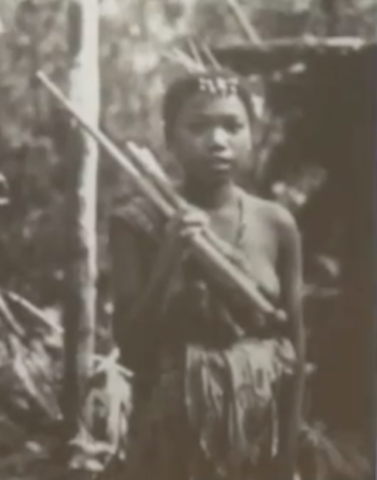
(39:00) Now we are going to look at a society in which there are t very strong egalitarian relationships; namely the people of Batek living in the rainforest in Malaysia. And this is a girl going hunting. In Africa women will hunt and they will kill, but they won´t do it by piercing, the way men do it; piercing the pig with a spear when they want to kill it. If a women try to kill she has to do it in a way that´s not causing the blood to flow. And that´s really important. By contrast this Batek girl can kill monkeys and birds with the poisoned arrows she is holding in her hand. And it does seem that in Southeast Asia the symbolism of blood hasn´t got the same structural function of organisation that it does in Africa (40: 47). But it still is there.
Blood is very powerful and there are very strict rules not mixing different types of blood and it is thought that serious problems can happen to people if you mix wrong types of blood together. It might cause terribly thunderstorms, or flooding to happen which causes the land to disappear and people can get washed away and get drowned in these thunderstorms. It is the Thunder-God Tuha who sends its down if people don't obey the proper rules for keeping blood apart. So blood remains important, but less so as in Africa. And although menstrual blood is very important, in this tabu system, it doesn't have quite the same power as in Africa. So here we have the Batek, but we have also the Akta who lives in the Philippines, where women also hunt more often, than they do in Africa, and using these processes of piercing bodies.
Whats interesting in Southeast Asia is that although they have gendered roles; men normally hunt and women normally give birth, they are not bound in the same way as in Africa to gendered bodies. You do have gendered roles but gendered bodies can more easily do each others things.
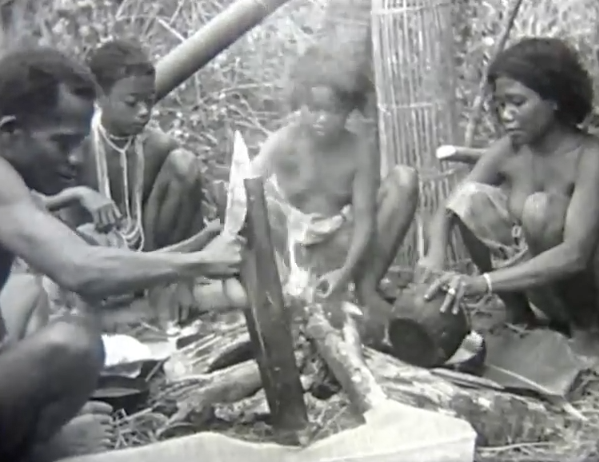
Egalitarian societies are societies in which neither sex has control over the other, or greater cultural value.
(42:28) In Africa there is a certain sense of what is appropriate for men and for women, and women and men cultivate these quite strongly. Although they will do each others things and it doesn´t cause trouble. So the title of Endicotts book, when eventually Karen was persuaded to formally public her work, is called The Headsman is a woman.
The Endicotts defines egalitarian societies as; Societies in which neither sex has control over the other, or greater cultural value.
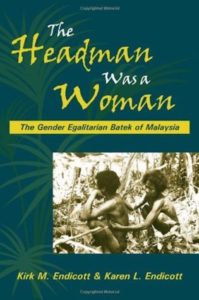 The Batek recognise men and women having different physical qualities, but they don´t evaluate the qualities as being higher or more or less important than the other. So men and women in their daily life, decide what to do, nobody is telling them you cant order someone to do this or that. So people have control over their bodies.
The Batek recognise men and women having different physical qualities, but they don´t evaluate the qualities as being higher or more or less important than the other. So men and women in their daily life, decide what to do, nobody is telling them you cant order someone to do this or that. So people have control over their bodies.
And they have an equal voice in camp affairs, so the headman in one camp was a woman, so that was entirely acceptable in the Batek Community. They are equal partners in marriage, there are no questions about the man or the woman telling the other one what to do. And actually the choice of spouses is entirely free; the couple decide themselves how they want to do it. And this is true in all these hunter and gatherer societies. And likewise, as coming together as a couple, divorce is just very straightful - you just leave, you go. And there is no expectation that you have to give any explanation. You are free to leave and nobody can force or command you.
(45:00) All economic decisions and others are made jointly by man and wife. Neither depends on the other for access to key resources on which their lives depends. And demand sharing is done simply by being around, you just have to be there and demand what you need and you will get it and its no question of noone resisting or denying you that. So noone is dependant on other persons, for access to key resources.
Moments occur in these societies where authorities can be seen but its not the authority that we are used to. What happens is that it is a consentual identification of one individual who happens to be good at something. So for example among the Batek you have certain healers who are recognised as being very effective at healing other people. In the moment of illness people will refer to that healer for guidance of the rituals needed to heal the person of illness. And an other example is elephant hunting in Congo, which is a very dangerous business and some men have more knowledge of elephant hunting than others. And at that moment when they set out for an elephant hunt, people will turn to that person and tell him to lead them, and then he will start to organise the hunt. But as soon as the mission is fulfilled all authority disappear from that person. And when the healing ceremonies is over, the shaman or whoever it is, will just sit back and become an ordinary member of society. So the role of authority is in the ephemeral moment of organising the wellbeing of the group, rather than for any benefit for any individual.
Group decisions are not based on some persuative individual making it seem like the most attractive option. But by those individuals among the Mbendjele who are able to listens to all the individual´s points of views going around the group, and then somehow reformulates them so that everybody finds themselves represented, everyone somehow finds their point of view taken into account, are choosen as "consensusbuilders". Consensus building is essentially much much more demanding than rethorical persuasion, which is just a force of logic, and logic is a prostitute you can put it to anyone for any use. but consensusbuildimng is very hard. It really requires very strong listening skills and thinking beyond the words and find that unity that makes everyone coming together.
THE CHILDCARE AMONG HUNTER AND GATHERER:
One thing thats particularly interesting in egalitarian societies is that parents don´t have authority over their children, parents cannot force their children to do anything. So for instance if a child does something that´s dangerous, or you want to stop it from doing something you cannot say: “Stop doing that, that´s dangerous!” Instead you must say: "Oh, that´s a taboo; the tiger will come and eat you if you do that again" Its always put out to the supernatural or some dangerous animal, rather than to the parent him - or herself, and that subtle difference is very important in assuring that the young children will be very much socially inculcated with a refusal and abhorrence of authority over people or ways of ordering peoples to do things (49:14)
ATTITUDES AGAINST VIOLENCE
And one of the very important differences between Southeast Asia and Africa is the role that violence play in the social relations. In this Batek society violence is considered to be a form of madness. Its something that normal healthy people just don´t do, to attack someone or physically aggress them. And this non-violence is a very strong quality of these southeast hunter and gatherers. Endicott said that because no aggression is tolerated in these societies, the men hasn´t got the option of using brawn in order to dominate women. And if you think about Dukas story you see how the brawn of men can bee deployed to really impose their will on women.
(50:00)But thats´s NOT the determinating factor of gender equality, and that´s whats very interesting, when we now turn to these African examples for examples, for instance the Hadza. You can see that the have many of these structural similarities described of, how equality is achieved in these societies. The abhorence of violence is quite differently interpreted among Hadza and among Mbjendele. Violence is accepted as one way of negotiate social relationsship; the carefully control violence, but in the Mbjenfdele case, drawing blood is really out of the question, they have ways of fighting and levels of fighting, and levels in engaging in physical contact with somebody arguing and disputing which tries to manage the aggression, so that it doesn´t lead to bloodletting because that´s tekila; its taboo to cause blood to flow from another human being. So for instance the highest level of fighting is not using or machetes, which are available everywhere, but, in the case of men, they are using firewood so they will take turns, swiping each other with these huge trunks of firewoods. And firewood has to be a bit rotten to burn, so it sort of plunge and crunches a bit so that it takes away the blow. The most dangerous way of fighting that the Mbjendele have is with this green pole freshly cut sticks, and that is really dangerous because if its swung with enough strength it could crack your scull. But I have only seen that be used by women against men, when men go crazy after have been drinking too much. And the women will group together hit them with the sticks until they calm down. And its amazing how quickly people calm down when they get ? on their head.
Why this is so is an open question. JL suspects that´s got something to do with the nature of the animals, that people are hunting in these different places. So in the Hadza and Mbjendele context, where you have these really large animals - you do need to be quite fierce to kill an elephant or buffalo with a spear. But in the Batek or Akta situation, you do have wild pigs, wich do take som effort to kill, but most of their hunting is using poisoned darts killing smaller animals as monkeys and birds. The level of aggression that you will have to deploy to succeed is less. But that´s just his own speculation JL says. He doesn´t really know why it is so different.
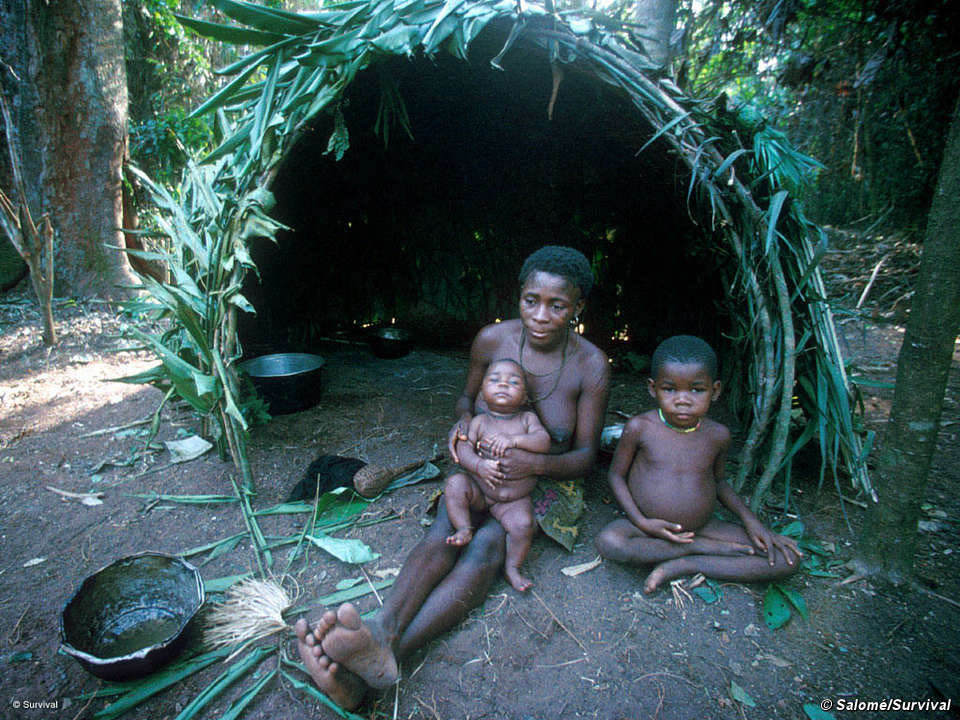
THE TABU OF MIXING BLOOD
(53:45) But what really is the big differentiation between men and women is this business with blood. The difference between the blood of women and creation symbolised by menstruation and the blood that men spill when they kill an animal. And it really is remarkable how consistent across cultures this distinctions between blood is. If you think about armies for example in the modern era, its only in the past few years that women have been allowed to go to the frontline and start shedding blood themselves.
Butchers traditionally were never women and certainly not in France where it right up until very recently were really remarkibly strong. In Churches for example you can´t when menstruating go and mix your blood with the blood of Jesus by take part in the communion. You are not even allowed to walk in the church. Very often in religious rituals will try and distance themselves from menstruating women. In France the say that menstruating women can turn red wine sour by opening the bottles. This division is really profound and at the heart of the human division of labour. That is the fundamental symbolic.
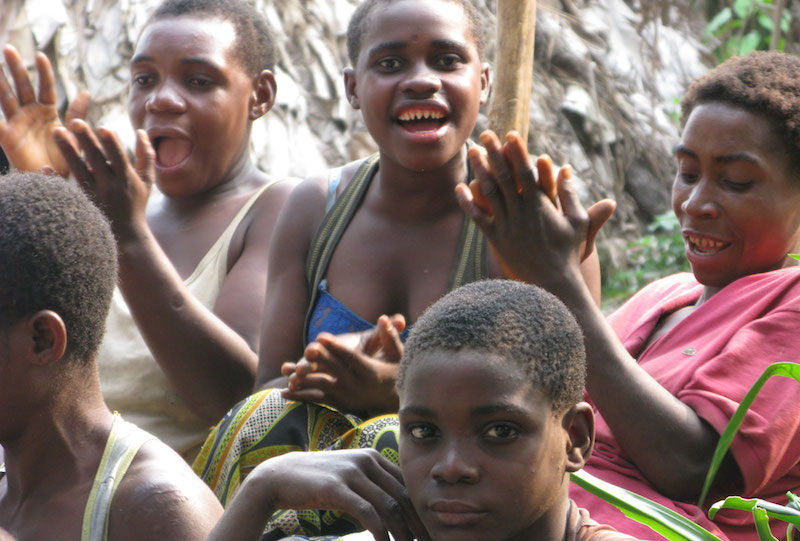
EKILA - THE MBENDJELE TABOO SYSTEM
(55:16) Among the Mbendjele it is expressed in terms of Ekila. (In this article JL explains this complex taboo system). And all the pygmé groups have this system. Even though they haven´t been in contact with each other for tenth and thousands of years, they still have this taboo system in common, in which the two different kinds of bloods must be kept seperate. The M´buti call it Ekeri and the Mbendjele Ekila. And as in linguistics "r"and "l" are classic slippage consonants, they are still basically calling it the same thing, even though they last shared a mother twentyseven thousand years ago, which shows how really strong these cultural means are.
Ekila is something thats associated with a whole set of taboos. These taboos sort of develop when people go through life and you get to take on more and more of them. Particularly as you´re becoming an adolescence the taboos really start kicking in. And taboos are effectively making you think about something making you realise and ponder; Why is that significant? So these taboos really do have a role in making the cosmology emerge experience in every individual who lives in that society. So for instance one of these things that Mbendjele say is that the audeur of menstruation, of menstrual blood, angers forest animals. So women are really frightened of going into the forest, when menstruating, not because of the forest itself, but beacuse of the smell of their menstruation wich could upset buffalos, elephants and gorillas to knock them down. And if you are a man, and have been sleeping next to a menstruating women, then the animals will single you out and attack you. And this is something that is very strongly felt.
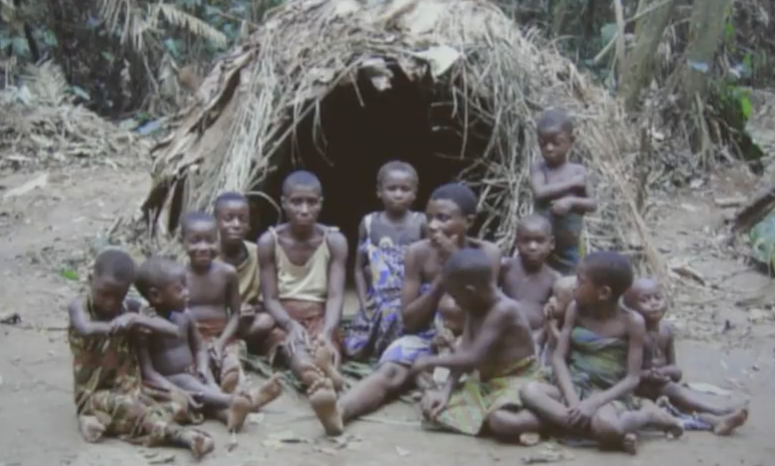
THE MENSTRUATION TABOO - THE WOMEN BEING MARRIED TO THE MOON
So what women say, is that actually that while they are menstruating they are with their other husband and that´s the moon - her biggest husband is the Moon. This is remarkable common; The liaison between menstruation and the moon are right across hunter and gatherers and it has caused Chris Knight and Camilla Power, and also LJ have thoght a lot about it lot of thinking about it and the role of the moon in the evolution of human beings.
So as long as a man has been sleeping with a menstruating woman or pregnant woman, it will chase all the small animals away. So it is useless to go hunting. But as long as a man doesn´t smell of human ekila he can pass without the animals getting afraid or angry. So what happens is then that men´s and women´s behaviour in the forest is then affected by the these believes, so that when women go into the forest they walk in large groups with the kids making a lot of noice and they sing really loud, so that the animals know that they are coming and don´t get surprised and have a chance to disperse. Whereas when men go into the forest they are silent and they don´t need to talk to each other, they use sign language to communicate, they can use their hands so that the animals can't hear them. And they are walking silently and are trying top calm forest so that they can just spring up at the animals without their realising that they are coming. So these different believes then have an impact on the different manners and way of doing things that man and women have. So it genders way of walking, and it genders way of talking these ideas, in very powerful ways.
And in speech whereas men - there is a tone language so its a certain kind of of musical quality to it, but when women speak to each other they have all sorts of explitives that they use to enhance the conversation. Its not as when you all sit here silent and well behaved according to European standards, but if you are Ndjembele, you would shout out sounds in response to what is said. If somebody tells something dramatically ; the response will be Iiiiiiiii, or impressing it will be: ohhhhh, In all these conversations, you are not passive sitting there receiving, you´re contributing back your responses through thes explitives, duration: teeeeee and so on. There is a whole vocabulary of these expletives. These things are all of that kind that would be very difficult for us in a hunter and gatherer society
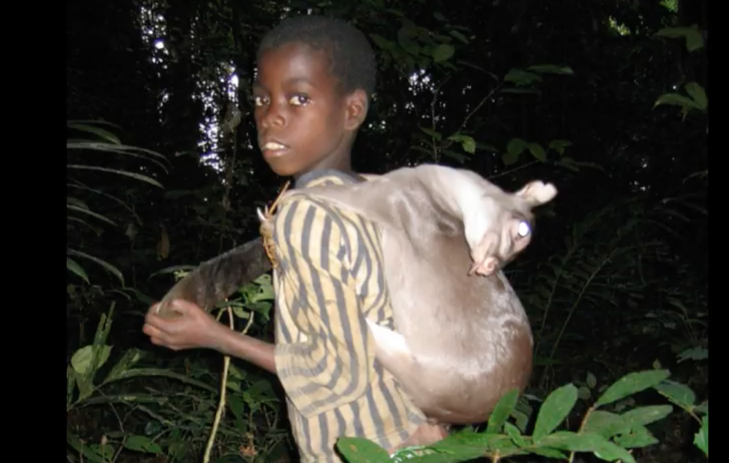
So these tabus have unusual consequences. For example with this blue duiker, which is one of the most easy to kill and capture, and you can call them to you with a sound, but when they run away from an animal that´s hunting them, they will turn their head to look back,in the way the duiker do on this boy´s back. And in that moment of turning away, is said to be Ekila for a pregnant women to eat this animal, despite it is one of the most esy to kill animals, because if she does, there is a risk that her fetus, when she tries to give birth, will turn its head back and willget stuck. So the way that the different taboos work, is always to emphasise this link between proper conduct of hunting and proper conduct of food preparation and what you eat and how that affects the body. So believes about the potency of blood and particularly the menstrual blood have extraordinary cross-cultural ramifications for women´s statues in these societies, because in these societies it gives them power. And that´s quite different to what happens in patriarchal societies where menstrual blood is what makes women unclean, what makes them like animals, what make them less than men and is looked upon as a sign of wilderness and their animistic nature as opposed to mens cultured civilised nature.
So basic believes about Ekila and the explanations that people give for them, differentiate people according to gender and to a less extent to age because as when you progress through life different tabus become relevant. They define what animals you can eat, wheather you will hunt as a man or cook as a woman. And cooking is the process of turning something dangerous - the flesh of a dangerous animal - into something safe, beautiful and tasty and being enjoyed by everybody in the community and in fact grows the community making it strong; so something that is potentially dangerous is taken out from the forest to get converted by the women inside the group, to something that is safe and brings strength to the members of the group. And it affects even the style you speak; if you go loudly singing or silently signing into the forest, or wheather you walk alone or in groups.
(1:o4:50) So menstruation is culturally elobaroted to become clearly expressed differences between the genders. And the gender ideology that defines the procreate activities and behaviours for men and women. What that does make, is to connect gendered expectations to these inevitable features of the body. Menstruation has to happen if human beings are to recreate themselves. If its not happening its something wrong. So by linking something so central to human living in society to inevitable bodily processes thats necessary for life to continue, you can be really sure that that thing will be passed down the generations, which is important in societies where we dont´t have authorities telling people how to do things. So menstruation really becomes a gender ideology that defines the propriate activities and behaviors by linking them to the inevitable processes in the body and that makes the gendered division of labour and gendered roles seem natural and inevitable and logical.
(1:06:20) So it suddenly becomes normal and natural once you understand these relationships. For the things men and women do, when obtaining vitality from outside as men do, or transforming vitality into new human life within the group as women do - and even in their folk biography the idea of pregnancy and birth, is that men have to deposit their seed again and again in the womans womb, wilst she then miraculously transforms that seed into a baby. The seed coming from outside is then transformed within the female body, to create this beautiful child, that then emerges from the women´s womb. So Ekila defines how the bodies vital forces and reproductive potentials, productive activities and their products, moral and personal emotions should be shared. And one thing that´s often skipped in the literature of hunter and gatherer is the importance of sharing quality of emotions. And a lot of hunter gatherer actvitity is about assuring the quality of the emotional relationships between members of the group. And ritual is really central to that, but also for respecting these taboos.
So from the point of view of the Mbendjele the good life is assured by respecting these taboos by knowing how this should be shared and who this could be shared with, and thats what allows peoples to experience unproblematic childbirth, successful childrearing, and successful hunt and gathering. And if you have these things you have a good life. And the Mbendjele is very clear about this.
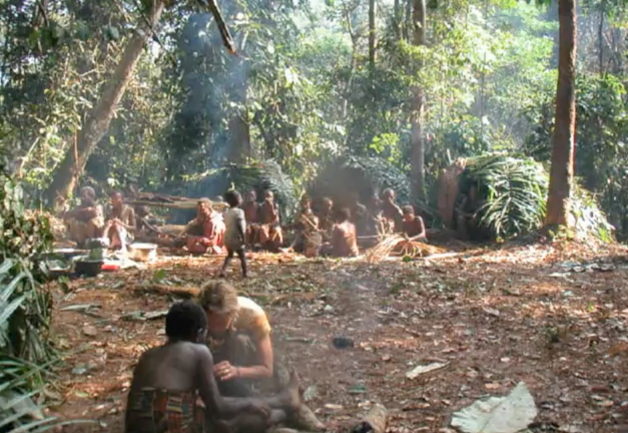
So this is a typical Mbendjele Camp. What we have here are the huts going around the outside of the camp. And in the middle of the camp you have the men´s area called Banju. And the men will hang out here during the day and women will be sitting outside their huts in front of their herds and with their children talking discussing and so on..
(1:08:38) One of the striking things is how people behave when going out in the forest. Sometimes romantic couples disappears into the forest together. But generally women go out in large groups, making a great deal of noice. And men go in small groups silent, hunting. So there is a very strong sense in which these societies are like two societies, one of men and one of women. And that is something that even an outside farmer reacted to who came here. Its like two totally different societies in which women are doing one thing and men another. And in fact thats true to a large extent for Hadza as well and even for the San people JL thinks, so in this sense there is a distinction between Eastasia and Africa. What´s interesting among the Mbendjele and Hadza (and perhaps also San, JL is not sure about that) is women´s solidarity which allows them to resist male brawn. So if men starts misbehaving and exert domestic violence, very quickly the woman´s girlfriends would come to her support and start beating the man, who is being unreasonable with his partner or with his wife, and quite severely - women would be merciless with men who loose it this way. And this is the time when you see the green sticks come out.
So you´ve got people living in fairly small groups like this one, with thirty or fourty people. And everyone knows each other intimitaly.
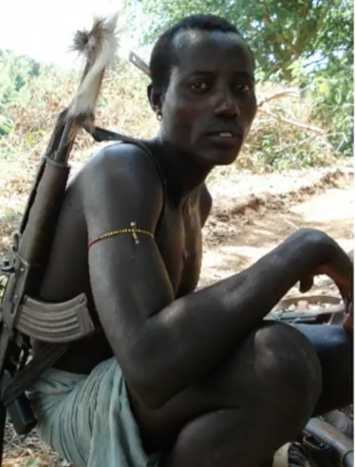
EVERYBODY GETS HIS OR HER SHARE
This man is the Makongo, the hunter. He has no part in the sharing. Its taken from him as soon as he gets into the camp. The hunter is really concerned about that everybody is getting his or her share, because that makes his hunting success secured in the future. If he doesn't share, its going to ruin his hunting; his Equila, so he is making sure that everybody gets his part of the food. Its devided up by somebody else. There are some people who never contribute, as for example those who have got polio since their childhood and just can´t go hunting. But they always get a share. Old people always get a share. People who are old and sick and just cannot go hunting, they always get a share. People who are mentally or physically challenged in anyway and can´t produce - your presence is the only thing that is needed is needed for you to get your share.
(1:11:54) As their are no authorities in these societies nobody can order any other - war is impossible. You can´t have war if you cannot order people to do things against their will. One of the key features in most armies are the nasty peoples standing behind shooting anyone who desert. And I think in the first World War more people were killed like that, than they were by the opposing forces. So people have economic independence from each other, and no-one is dependant on the other to get access to key resources and now I will briefly tell you about the Mbendjele Creation Myth.
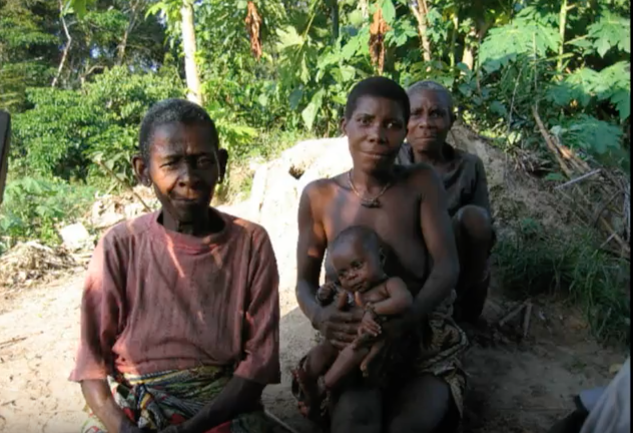
WIDOWS MIMIC WITH CLOWNING HUMOUR
(1:12:46) The widows have a very special place in this society, because they are the only ones who can openly critisize another, but when they do it, they don´t do it by naming namers, but reenacting the foolishness that that person did, and they will do it with great clowning humour. What happens is that the women by gathering need a little break and they put their baskets down and are sitting down, and by then the two old ladies will get up and start imitatitating the one who did somethíng foolish or stupid. And they wouldn´t say who it is and just allow people to watch and and soon people start commenting what was stupid and foolish; and it elicits the whole commetry on what appropriate moral is; not from the old ladies, but from the kids and all the other who are watching. And so suddenly people are becoming aware of what moral behaviour is, but without any moral authority telling it. And the old ladies have got these technique that they wouldn´t stop reenacting until the moment suddenly someone realise; - Oh shit that´s me! And everyone is laughing at me. And you then start to feel very ashamed of yourself. But the only way you can stop it is by laughing too.
But when you suddenly realise that you are the center of everybodies mirth, you know its difficult to laugh. But you somehow must come to terms with what you have done, because then its over and thats it.
But sometimes its too much and I often have seen men run off into the forest who cannot take it any longer, embarassed for their kids and their moms and dads and their best mates and everyone else to see what a fool you were last night in bed with your wife. So (maggio?) is really a crucial power that women have.
And if men do it it just causes fights, but when women doing ity its very powerful. So the literal power that women wield in the society is based on their solidarity and their skilled abilty to mimic other people. And mimicry; imitating is really crucial to this power. By contrast men´s political power is derived from their brawn, from the strength they use to chase down these big dangerous animals and kill them. And the techniques they use for that is imitation; to mimic the large animals so that they will come out and can be hunted more quickly.
_____________________________________________________________________________________________________
MY COMMENT:
Although Jerome Lewis seem to avoid the word "matriarchy", I think it it is fairly obvious that the hunter and gatherer-socities he describes fit very well in to the definition of "matriarchy" elaborated by Heide Göttner Abendroth and can be read here:
Also in this video it becames quite clear that its the women who are in charge of the main responsibilities as the speaker tells:
“The first participants to come on stage are the grandladies; A titel born by mothers, since they are the ones who always have had the primary responsibility for the survival of the community.”
Now at last Jermoe Lewis is going to tell us about the Mbendjele Myth of Creation:
”Its a rather remarkable myth, he says. I just had a post doc. from a college that has been looking at the key rythms from hunter gatherer around the world and trying to trace how they are connected to one another or not. And whats quite extraodinary is that the key rhythm that is associated with the spirit called Edjengie, who appear in the Creation Myth I am going to tell you about right now, also turns out to be at the very base of the musical phylogenetic tree of humanity. And this is rather remarkable.

THE VERY FIRST MYTH OF CREATION ON THE EARTH - MIRRORING THE WOMEN´S REVOLUTION OF DANCING AND SINGING AND MAKING THE SPRITS EMERGE OUT OF THE FOREST
How society came about
Jerome Lewis tells the The Myth of Creation of the BaYaka
Its a rather remarkable myth, that among others has its origin in the fact that women loves meat but they also love honey. And honey is very difficult to get for the young men, who for that purpose have to to climb up high in the trees, which is very dangerous. But these products are so valued and cherished that they have to be collected, as women just love them. And if you want to marry a woman you have to get some honey. Its by offering her honey and she accepts it you will get married to her.
So thats one of the reasons to why honey matter so much and plays such an important role in this creation myth.
In the very beginning men and women didn´t know of each other the creator Komba put men in one part of the forest and women in another and hedidnt´t tell them the the other group existed. And the women they fished and collected wild jams, they collected wild leaves, fruits and tasty insects that there are in this forest and they ate. And in order to have children they danced the Edjengi, a sprit made of cloth, and out of the cloth the spirit spun and small babies would fall out and new girls would be born. And they went on living like this very happy and satisfied. While men on their side they weren´t that quite well of, because they used to take these Mapombe hard shell of calabash to make with, married to Mapombe, and they were hunting elephants and pigs, collect jams also, and honey and leaves and so on and at night they went to sleep with Mapombe and Masturbate with him. And of course it wasn´t particularly pleasant with the hard shells…
Women have one version of this myth and men another, so Jerome Lewis is telling the men´s myth´. In the women myth its a female thats the protagonist that makes everything happen, and in the men´s version it is the men who do that.
One day the elder of this men, who was called Tulli, decided he wanted to go hunting by himself. So he took his spear and off he went to a part of the forest he didn´t know and went further and further away, he crossed rivers and suddenly he was in a part of the forest he never had visited before. And he looked around and when he crossed one stream he saw a peace of jam that had been digged up and washed floating down the stream. And then he thought; -Ha! Only people wash jams before they eat them, so it must be people up there! He runs up the stream and gets to the top of it, and to his surprise he can hear this amazing singing going on, and he is enchanted. So he goes further and looks through the bushes and sees these beautiful things he never has seen before; These wonderful women dancing and singing and this gorgius spirit Edjengi spinning around. And he is getting a huge erection, and the women just get chocked and cries AHHH! And Tulli thinks they are so beautiful and he just loves them all. And then they make love and Tulli thinks this is great and superb. And when he is falling asleep that evening together with the women, he is thinking I have to tell my friends about this.
And even before dawn he is out there and hurry very fast back home to his fellowmen. And he shouts - Hey guys I have just found these amazing things calledwomen, they´re all over there in the forest …! And the other men wouldn´t believe him, and just said: - Shut up, old man! We all know you. You are always full of rubbish! And they started insulting him. But Tulli said -No, no I promise you. Look tomorrow we will just get some honey and we will go there. And the men actually found lots of honey, and every man took a leave parcel with honey with him and so they went off. And Tulli took them direct line through the forest to the place where the women were dancing Edjengi again.
Now Tulli said: - Look! Bofienga! Thats how you are you are hunting the pigs, first a group of men encircle the herd, using one man to run into the herd and try to kill a pig with his spear, and then the other pigs run out to be catched by the other hunters in the wider circle.
So now the men made Bofienga with their honey sacks on their backs and one of the men charges right in and he goes with the oldest lady there and, poof smashes the honey sack right on her forehead and all the girls and the women are screaming and start running in every directions and then the men are splashing the honey sacks in their faces, poof, and when this stuff starts leaking down the faces to the lips of the panicked and running women, they all of the sudden feel the wonderful taste of honey.
Oh that´s really good! they thought.
Maybe people who gives us things like these, aren´t that bad after all!
We should perhaps slow down a bit. And of course every man finds a woman and they make love, and the men are thinking; -Gosh! This is wonderful. What did we do with this horrible Mapombe. We´re going to stay here!
And then they we´re spending the night together and getting on very very well. Then, early the next morning, when the men woke up and the women had disappeared and they looked everywhere for them and asked -Where are those women? Where are those women? - They went off in every different direction looking for them. And then, when listening they of course could heard the women singing and dancing the Edjengi over in the bush. And the men said; -Oh! We can´t have that! You´ve got to give us the Edjengi! They demanded the Edjengi from the women. - You can´t carry on making those children! Look, we´re going to throw away our Macombe, and they throwed it way. (It was not such a great loss, anyway.) - We want to have sex with you, so now you give us that Edjengi business, so your´e going to have children with us, and not with that Edjengi any more.
And the women said: -OK. Just take the Edjengi! Its fine! No problem! And they gave the men the Edjengi. And so the men now dance the Edjengi. And if the Edjengi touches a women when he dances she will bleed to death, she wouldn´t stop menstruating,. Because men are so filled with that extraordinary fertility power from the spirit so that it delivers a kind of superdose of fertility to the women if they touch it.
End of story.
SOCIETY WAS CREATED BY THE WOMEN REJECTING THE ALPHA MALE
(1:26:00) So whats so very interesting with this myth, is that it explains how society was founded. And if you listen to how Chris (Knight) and Camilla about their theories on prehistory about how society was created - it was basically done by the women rejecting the Alpha male. And in one sense Edjengi could be seen as symbolising this Alpha male, that the women rejected in exchange for having, as the say; “one woman - one penis”; there is a song that the women sing: - One women one penis, hey! One woman, one penis, hey! - reminding all the men that monogamy is the proper way of being.
What it also shows- and this is a crucial thing in the male - female relationship in egalitarian societies; is that women are autonomous economically from men, and so are men from women
Women love meat and honey, so they like men, but they don´t need men. And that´s crucial. And similarly men don´t need women, (Well, actually we do need women to make children, but we don't talk about that too much, JL says) But they don´t need women for staying alive.
So the myth actually talks about the primordial activities of men and women and they remain gendered in labour division: it is still the same as it was in this primordial groups. And its that lack of dependancy which is crucial for the egalitarian gender relations, and perhaps more crucial than the brawn, or lack of brawn, that men and women might have. And the separation in gendered spaces during the day, with the men and women working together in different places, is a constant reminder of this time before society existed, when men and women were separated.
And what is very interesting about the religion, specially the women´s singing will call out the spirits out of the forest. And by emerging into the human group they create a sort of euphoria, shared out among all present. And their “religion”, or what you might call a “religion”, is very interesting as it has no dogma, it has no texts. What it does, is just sings and dances - is just song and dance. Their songs have no words, they are just vowel sounds, that people will exchange.
So you have a religion here thats almost beyond the grip of authority, beyond the ability of religious leaders to manipulate and propose various ways of controlling people.
And whats very interesting is this idea, that women gave forest spirits to men. And it is remarkable consistent among HG mythology across the world, that what we nowadays call religion, originated with women, and they gave it to men. And this again has some interesting resonances with the theories that Chris and Camilla have researched and developed around the evolution of humanity.
So this giving of the spirits by the women to the men, the women read as a sign of their strength. If we could give away such powerful spirits, then think of what we kept for ourselves. And the men present themselves as powerful by taking it; demanding it from the women, who gave it to them, imagine themselves strong and powerful in that sense. But this constant whying and undermining one of the other, is also key to how these gender relations remain egalitarian. So its not a nicy wisy way of thinking that we are always vey nice to each other, but you´ve got to consistently assert your egalitarianism with others. And the ritual life of these HG is very much focused on that.
And when Ingrid (which is Jerome Lewis´wife) gives the singing work shop later, I think she will also show you some of these womens coalitions. These are the young girls doing Gocku, which is a female spirit. And what´s very interesting about Gocku, is that when women start calling; its always these young girls calling first and they dance up and down the camp and visit every single hut and every single place where people are sitting. And they impose these women´s energy over the camp and they start to get the old women out, and then continues until they got all the women in one place and the women basically take over. And its a dancing and singing revolution that is reenacted very often in these communities. And when they are singing like this, they sing things like: - Oh, men are no good! Their testicles are broken! The vaginas always wins, he´s already sleeping. And they are constantly reminding men of the inevitable features of sexual relationships, and reminding men of just how powerful female gender is.
And so Morna Finnigan, who Chris and Camilla know very, well has done some very nice work, analysing the sort of ritual ?, she calls it, where women are asserting themselves over the community, speaking as one body, as woman speaking to the men, by reminding them of this key characteristics of the nature of gender relationships.
-The penis gives birth to nothing but only urine!
(1:32) By participating, these young girls sing this songs too, and start learning from a very young age, what their power are over men and learn how they can control men by the understanding of their femininity and their feminin sexuality.
Men, of course have their own rituals and when they dance the Edjengi its exciting, you know, you have all these handsome strong men, dancing with this vivid spirit coming out from the forest. And if it touch you, you´re going to bleed to death. I have seen young girls pass out from fear when they think the Edjengi should touch them. But men can control this powerful energy, and thats why their brawn become so sexy. Its not frightening because its used to defend the women. And then it suddenly becomes attractive and sexy. And when the Edjengi is dancing his movements ae like a penis ejaculating, and its really symbolically powerful for women, to witness it and from this they can get really horney, and sometimes even go out of control during the Edjengi ceremonies. A couple of times JL has had visitors with him, men from Europe, when the women have asked - Oh! He is not married!- and sometimes not, if they like some of these men and want to come up and grab his testicles and penis in the dance, which is very chocking when you are not used to it, as when it happens to us Western men taking part in the dance. You really don´t know what to do, or how to handle i.
And its this sort of sexual energy created by this men dancing and making the Edjengi coming out, that makes women quite crazy sometimes.
Sometimes it becomes so chaotic , that the women mess up the ritual so that the Edjengi has to return back into the forest, and the women have to start doing Gocku instead. I have seen that happen, when it really does go out of control.
So as Mona puts it (I cant hear what JL says here) ... "“down to the bones the vagina wins, the testicles are broken, penis produces nothing” is what the female body might say if it articulate itself to the male body to assert oneself. So Edjengi and the Gocku in these rituals are sort of two halfs of the conversation, each half undermining the strength and power of the other. There is a constant theme throughout the Mbendjele society where the special social products of one gender are ideological undermined as coming from the other agenda.
Women give birth to the men´s semen, that they turn into children. When the men go hunting elephants, which actually happens, women´sprior is going into trance and in that trance called Djele (?) they go into the forest and tie up an elephant - and they tell the men to go there and they will find their elephant to kill. They have already caught the elephant so the men just have to go there and do the easy bit, whereas the women have done the hard bit of finding the elephant. There is many examples I can give of this social capital of one gender undermine I can give many examples of this undermining te social agenda;
So what you see here is a complex series of ideological, ritual and practical ways that men and women ensure their autonomy and also undermine each others special claims to statues. And that is crucial for the operation of gender egalitarianism.
END OF THIS EMINENT LECTURE BY JEROME LEWIS.
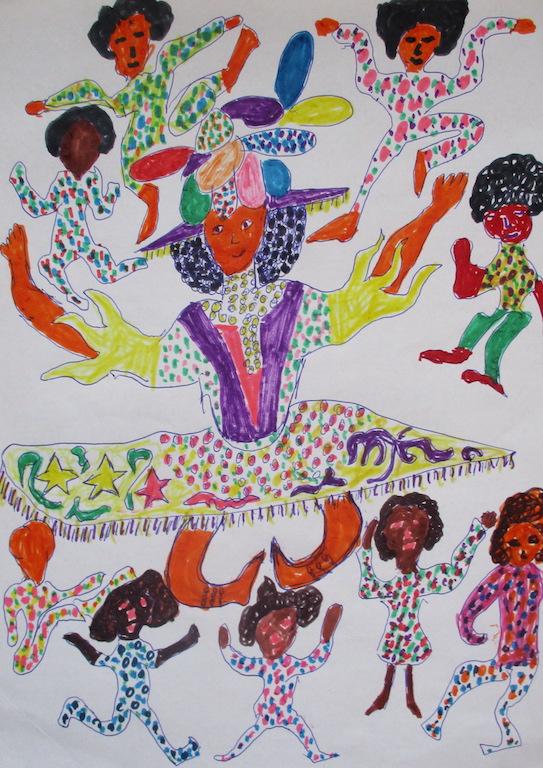
And from now on follows an interesting discussion with many questions asked in the audience, and when even Chris Knight has some comment on the theme of menstruation and "women´s biggest husband being the Moon", which is a subject he has examinerd in a very elaborate way, presented in his famous extensive work Blood Realations.
Blood Relations, is a must-read, as it is quite unique in its kind in anthropology, displaying a broad marxistist as well as evolutionary approach, without deteriorating to simplistic socio-biology, which otherwise is one of the more common simplistic approaches in anthropology of today, beyond the relativistic poststructuralistic one only dealing with modern symbolism in a very abstract way, using an incomprehensible vocabulary inspired by the "Father of Modern Anthropology" Claude Lévi Strauss, (who took science 150 years back in time to before Bachofen and Morgan), in order to mask the fact that it is dealing with male stream ideology only instead of science, which for instance is representative of the kind of "gender research" that´s pursued by the more dominant group of so called "feminist" female anthropologist / archaeologist and religion historian today who very aggressively and without being able to underpin their claims in a correct scientific manner dismisss their older female colleagues works as "essentialist". ( See my pages: Male Stream Science, Katarina Leppänen, Cynthia Eller , Stefanie Knauss, Brigitte röder, Elisabeth Beausang, Elisabeth Beausang, Randi Håland )
On the homepage of the organisation in Londen directed by prof. Chris Knight called RAG=
you can listen to a whole bunch of lecturers on this theme »
And later in november and december 2017 these lectures will be held:
The Sex strike Theory of Human Origins, by Chris Knight
Womens biggest husband is the Moon by Jerome Lewis
From Music to Language by Jerome Lewis
Human Evolution - Where Are We Now? by Chris Stringer
Spirits of The Forest - Selfgovernment Through Polyphonic Singing Ingrid Lewis
Communism in Motion - How Hunter Gatherers Make Egalitarism Work by Morna Finnegan
Morna Finnegan has two papers displayed at the homepage of RAG:
